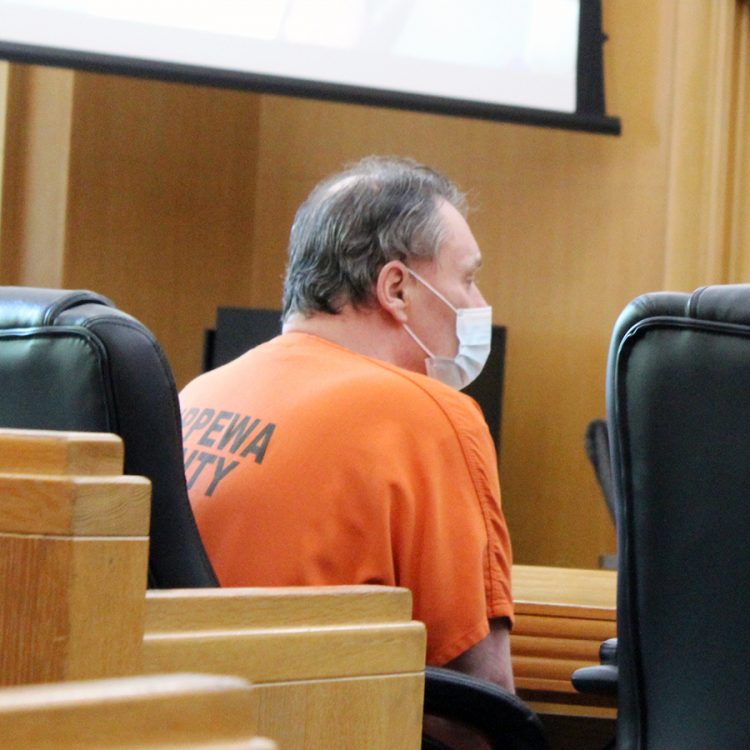Knitter sentenced in three cases, has time served for all


By Julia Wolf
Gregory Knitter, 57, Cornell, was sentenced for charges across three cases, during a plea and sentencing hearing July 8.
Knitter was accused of leading a high-speed chase starting west of Cadott, and ending in the City of Chippewa Falls, in April 2021, with juveniles in the vehicle.
Knitter faces one count of First Degree Recklessly Endangering Safety; one count of Operator Flee/Elude Officer – Bodily Harm or Property Damage; one count of Bail Jumping – Felony; one count of Cause Injury/ OWI (Passenger < 16 years); one count of Possession of Methamphetamine; one count of Possession of THC; and one count of Cause Injury/Operate Controlled Substance (Pass), as a result of the incident.
Knitter also was charged with one count of First Degree Recklessly Endangering Safety; one count of Bail Jumping – Felony; one count of Vehicle Operator Flee/Elude Officer; and two counts of Disorderly Conduct, Domestic Abuse, as part of a second case.
In a third case, Knitter was charged with two counts of Battery, Domestic Abuse; two counts of Criminal Damage to Proerty, Domestic Abuse; two counts of Disorderly Conduct, Domestic Abuse; two counts of First Degree Recklessly Endangering Safety; two counts of Vehicle Operator Flee/Elude Officer; and one count of Negligent Operation of a Motor Vehicle.
Defense attorney George Miller gave a brief overview of the plea agreement. As part of the agreement, Knitter would plead guilty or no contest to two counts of Battery, Domestic Abuse; two amended counts of Police Officer Fail to Stop; and one count of Negligent Operation of a Vehicle, for one case.
In the next case, Knitter would plead guilty or no contest to First Degree Recklessly Endangering Safety; and one count of Disorderly Conduct, Domestic Abuse, as part of the agreement.
In the most recent case, as part of the agreement, Knitter would plead guilty or no contest to First Degree Recklessly Endangering Safety; and one count of Operating with Restricted Controlled Substance in Blood Causing Injury Minor in Vehicle.
“All the other counts in all the cases are dismissed and read in,” said Miller, along with several traffic matters.
The joint recommendations for Battery, Domestic Abuse, would see Knitter placed on probation for two years, and 90 days of jail, consecutive for both counts in that case.
For the Police Officer Failure to Stop charges, the joint recommendation was for three years of probation and 90 days in jail, consecutive to the previous counts and concurrent with each other.
For negligent Operation of a Vehicle, the plea agreement recommends probation for three years.
In the next case, the agreement, for the First Degree Recklessly Endangering Safety, the sentence would be imposed and stayed, with three years of initial confinement and three years of extended supervision. Knitter would be placed on probation for three years, concurrent with the other cases.
For the Disorderly Conduct, Domestic Abuse charge in that case, Knitter would be placed on probation for three years.
In the final case, for the First Degree Recklessly Endangering Safety, the plea agreement would see three years initial confinement and three years extended supervision, sentence imposed and stayed. With the agreement, Knitter would have three years of probation, concurrent with all above charges, and one year in jail, also concurrent with the above charges.
For the Operating with Controlled Substance in Blood charge, as part of the plea agreement, Knitter would serve 30 days in jail, consecutive to all above charges. There would also be 14 months drivers license revocation, and ignition interlock device required for 12 months.
Each count across all the cases also includes that Knitter pay court costs.
The conditions of probation, across all cases, are no contact with S.V., or her residence; no verbal or physical abuse of anyone; take all prescribed medications; no possession or consumption of alcohol, illegal drugs or drug paraphernalia; no possession or consumption of prescription drugs not prescribed; no entry to bars, taverns or liquor stores; not to drive without a valid drivers license; not to drive with any intoxicants in his system; counseling and treatment as required by his agent; provide DNA samples, as required; and pay restitution, if required.
Knitter plead no contest to the counts, listed as part of the plea agreement. Judge Benjamin Lane found Knitter made a knowing and voluntary plea, and found him guilty of those counts. The remaining charges were dismissed and read in.
During his time for a statement, Knitter said he spent the past 14 months reflecting on the danger his crimes pose to the victims, the community and himself.
“I’ve come to see the importance of my medication and the embarrassing, shameful and dangerous things that can happen, if I don’t keep up with taking them,” said Knitter.
Knitter says he still has recovery to do. “If I could take it back, you know, I would,” said Knitter.
Miller says Knitter has significant needs, but is committed to his mental health. He says the jail term gave Knitter a long period of time in a controlled setting, to make sure he was on his medication.
Lane says he is considering the gravity of the offense.
“People were hurt,” said Lane. “People in your family were hurt.”
Lane also says he is considering Knitter’s rehabilitative needs and his character, adding he wants Knitter to get the help he needs, as well as the need to protect the public.
“I think the sentence that is discussed in these agreements, does that,” said Lane.
Lane told Knitter there is a great incentive for him to follow the rules of probation, because if he does mess up, Knitter would go to prison.
With that, Lane decided to go along with the terms of the plea agreement, including the terms of probation.
Miller noted there are 483 days jail credit on one case, and 439 days of credit for the other two cases. The sentence credit, if applied to the misdemeanors, would be time served.
“We do have to address the issue of whether or not the credit is applied to the conditional jail time,” said Miller. “And, I believe it should be.”
If it were applied to the conditional jail time, Miller noted that would also be time served.
Miller also questioned if consecutive sentences on conditional jail time is allowable under State vs. Maron, which would apply to the Operating with a Controlled Substance charge.
“The intent that I had in this, Your Honor, was that, there would be, on the felonies, an additional one year served,” said prosecuting attorney Lawrence Broeren. “On misdemeanors, it was my intention to run those together and give him credit for the time that he sat.”
Broeren says his understanding is that the credit would apply to the felonies, if Knitter is revoked off of probation, since the conditional jail time is a condition of probation.
After looking into the matter farther, Lane determined credit applies to conditional jail time, meaning Knitter has time served for all conditional jail time, as well as for the 30 days associated with the Operating with a Controlled Substance in Blood charge.




